#prophet muhammad story
Explore tagged Tumblr posts
Text
youtube
#quran#prophet adam story#english story#one islam#koran#abu bakr#first khalifah#caliphate#islamic story#caliph#prophet muhammad story#prophet muhammad death#prophet muhammad (saw)#history#islamic cartoons#prophet stories for kids#1st caliph#iqracartoon#prophet muhammad (s)#first caliph#prophet story#islamic history#prophet muhammad#yaqeen institute#muslim#victory#prophet stories muhammad#prophet's death#mecca#islam
1 note
·
View note
Text
youtube
#quran#prophet adam story#english story#one islam#koran#abu bakr#first khalifah#caliphate#islamic story#caliph#prophet muhammad story#prophet muhammad death#prophet muhammad (saw)#history#islamic cartoons#prophet stories for kids#1st caliph#iqracartoon#prophet muhammad (s)#first caliph#prophet story#islamic history#prophet muhammad#yaqeen institute#muslim#victory#prophet stories muhammad#prophet's death#mecca#islam
0 notes
Text
When someone asks me what type of love do I want… I tell them this story:
Aisha (RA) would ask the prophet (saw) to describe his love for her and he would reply: "Like a binding knot". In other words, the more you tug the tighter it gets.
Aisha (RA) would playfully ask every now and then: "How's the knot?"
And the prophet (saw) would reply:
“The same as the first day".🤍
#allah#faith#islam#love#love quotes#quran#islamic#muslim#god#surah#prophet muhammad#prophets#prophet#mohammad#daily duaa#duaa#love story#halal love#revert muslim#revert islam#revert#islamicpost#islamicquotes#islamdaily#quranquotes#holy quran#hayat#jannah
33 notes
·
View notes
Text
@suchastrangemess
I love videos of people performing religious ceremonies for small animals. Especially if it’s not something a small animal could participate in theologically.
#fun fact! there’s a story in the Quran where the prophet Muhammad tries to get a piece of clothing (if I’m remembering correctly)#but there’s a kitty sleeping on it#so he cuts the cloth around the kitty so it can sleep
107K notes
·
View notes
Text
The Night Journey: A Miraculous Experience of Prophet Muhammad (PBUH)
The Night Journey, also known as Al-Isra’ wal-Mi’raj, is a significant event in Islamic history that took place in the life of the Prophet Muhammad (peace be upon him). It was a miraculous journey that the Prophet undertook in a single night, traveling from Mecca to Jerusalem and then to the heavens, accompanied by the angel Gabriel.During this journey, the Prophet met several prophets, including…
View On WordPress
#miraj night journey prophet muhammad in hindi#miraj night journey prophet muhammad in tamil#miraj night journey prophet muhammad in urdu#miraj night journey prophet muhammad malayalam#miraj night journey prophet muhammad tamil#muhammad#muhammad night journey quran#muhammad&039;s night journey to jerusalem prophet muhammad the night journey#muhammad’s night journey#night journey of prophet muhammad yasir qadhi#physics of the night journey of prophet muhammad#prophet muhammad journey to the seventh heaven#the miraculous night journey of prophet muhammad#the night journey islam ks1 prophet muhammad&039;s night journey muhammad night journey story#the night journey islam summary the night journey islam story#the night journey of prophet muhammad#the night journey of prophet muhammad animated#the night journey of prophet muhammad mufti menk#the night journey of prophet muhammad nasheed#the night journey of prophet muhammad omar suleiman#the night journey of prophet muhammad reaction#the night journey of prophet muhammad saw#the night journey of prophet muhammad story of prophet muhammad night journey what is the night journey of muhammad muhammad&039;s night jo#the night journey of prophet muhammad urdu#the night journey of the prophet muhammad#the prophet muhammad night journey
0 notes
Text
Unearth the Night of Power: 5 Authentic Signs of Laylatul Qadr Revealed!
Can we see Laylatul Qadr? Laylatul Qadr could also be seen with the attention, for the one whom Allah helps to see it. That’s by seeing its indicators. The Sahabah (could Allah be happy with them) used to acknowledge it by its indicators. However not seeing them doesn’t imply that one won’t achieve its reward, if one spends that night time in prayer out of religion and the hope of reward.…

View On WordPress
#5 Authentic Signs of Laylatul-Qadr#Laylat-ul-Qadr#Laylatul Qadr#laylatul qadr benefits#laylatul qadr story#Night of Power#Prophet Muhammad#Ramadan#ramadan 2024#when is the night of power#why is laylat al-qadr important
0 notes
Link
0 notes
Text
in case anyone is interested in learning some stories about islam
some background, in Islam, there are lots of different prophets and they were blessed with special gifts. the prophets all had friends that are called companions and they're collectively considered the best of humanity.
during the days of Hazrat Sulaiman (King Solomon), his people were walking through an area but he heard an ant say to its fellow ants to hurry into the colony so they don't get trampled and Sulaiman stopped to pray and thank god that he could do righteous things like being mindful of the life around him
the last prophet, who's also the most famous and considered the best of humanity, Hazrat Muhammad, had a cat named Muezza who he loved so much he didn't mind drinking water that Muezza stuck his face in
Hazrat Muhammad loved Muezza so much that when he was called to prayer and Muezza was sitting on his sleeve, he chose to cut off his sleeve rather than disturb Muezza
there was a woman who used to throw garbage on Hazrat Muhammad every time he had to walk by her house on his way but one day she didn't so he knocked and went into her house and saw that she was sick so he nursed her back to health
Hazrat Muhammad called his younger cousin Ali, Abu Turab, or Father of Dirt because he fell asleep in a mosque absolutely COVERED in dirt
on the way to Makkah (where Hazrat Muhammad was born and basically abused and thrown out of when he became a prophet, he was coming back to claim it in peace) there was a dog and her puppies in the path that his army had to walk through so the prophet gave the dog family their own guard to keep them safe while they walked through
Hazrat Muhammad, again, the single most important human being in Islam, was praying with his head to the ground (prostrating) and his grandkids climbed on to his back so he just stayed there until they had their fun and got off and then continued his prayer
there's a lot of poetic justice on the day of judgement so people who were arrogant are turned into ants, people who masturbated will have pregnant hands, real creative stuff
there was a battle of trenches where the Muslims dug huge trenches to protect their one exposed side and without resources like water and food, to suppress hunger, the diggers would tied a stone to their stomach and pressure would make them feel less hungry. they went to complain to the Hazrat Muhammad that it wasn't fair. when they reached him where he was digging in a different part, he just lifted his shirt to show them that he had two stones tied to his stomach too.
once Hazrat Muhammad was sleeping at his companions house and early morning on Eid (think Christmas level celebration) the companion's daughters were singing while the prophet was asleep. his companion was telling his daughters to quiet down because he, the most important person, was sleeping and the prophet wakes from his sleep to basically say it's Eid. it's a day to celebrate. let them sing even if it disrupts my sleep.
Khalid bin Walid, one of the companions was so fucking sick, he was called the sword of god and during one of his battles he broke nine swords. he broke nine swords. he was also ambidextrous and fought with two swords.
disclaimer: I am not a religious scholar, I just know some things. For reference, I was born, raised and schooled in Islam for a really long time. I am not a Muslim, so please feel free to correct me or add on any religious stories from any religion.
#islam#religious stuff#actually traumatized#muhammad#prophet mohammed#stories#quran#learn something new every day#i may not be a believer anymore but we stan Muezza#swords#cats#prayer
0 notes
Text
https://wordofprophet.com/story-of-prophet-sheeth-in-islam/
Story of Prophet Sheeth in Islam
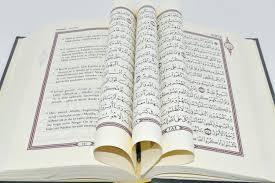
In Islam, Prophet Sheeth (also known as Seth in some Judeo-Christian traditions) is considered to be a prophet and the son of Prophet Adam and Eve. His story is not extensively detailed in Islamic scriptures like the Quran, and much of what is known about him is derived from Islamic tradition.
Prophet Sheeth is believed to have been chosen by Allah to continue the lineage of prophethood after the death of his father, Prophet Adam. He was known for his righteousness and piety, and he taught the monotheistic message of Islam to his people, emphasizing the worship of the one true God, Allah.
Prophet Sheeth's main role was to guide his community in adhering to the teachings of Islam and living a righteous life. While the Quran does not provide many specifics about his life and mission, he is recognized as one of the many prophets sent by Allah to guide humanity on the path of righteousness and monotheism.
Read his story.
1 note
·
View note
Text
I speak a lot about how ironic it is that Christians that hate Islam want to be taken seriously for their faith, but I don’t think the average person understands how deep this irony goes.
For those not well read in both faiths, Islam is a nearly 99% identical copy of Christianity. Moses is Musa, Abraham is Ibrahim. Gabriel is Jibreel, Adam and Eve is Adam and Hawa. Joseph is Yousef, Job is Ayub. Ishmael is Ismael, Isaac is Ishaaq.
Same prophets, almost the exact same stories and canon. Muhammad was an illiterate shady businessman who saw Christianity for what it was, a way to control women and shut down critical thought. He aspired to be a pedophile warlord and borrowed methods from the exotic west to fulfill his goals.
His first wife was older than him. His last was a 6 year old. As he gained power through conquest after conquest, and had his “miraculous visions” of verses being revealed to him, no one could tell that nearly every line he spoke was a stuttering copy of a faith already popular in a far away land. His fellow traveling merchants could, and he was a laughingstock to them. His first scribe could and was banished for noticing his obvious plagiarism…He eventually had to switch gears and market Islam as a “final chapter” of Christianity.
So anyway, that’s why I find interfaith arguments darkly hilarious.
707 notes
·
View notes
Text

In an effort to raise money to cover his mounting legal bills, former President Donald Trump announced at a campaign event Friday that he was selling the central religious text of Islam in a special new edition called the “God Bless The USA” Quran. “It’s a very holy book—really the holiest of all the Qurans you can buy—and it’s time for America to bring back the word of God as revealed to the Prophet Muhammad,” said Trump, who promoted his version of the scripture sacred to Muslims by standing in the minaret of a mosque and stating through a loudspeaker that the $60 book was the only Quran inspired by country singer-songwriter Lee Greenwood’s signature hit. Full Story
323 notes
·
View notes
Text
Ok list of prophets that were my favorite:
Prophet Muhammad because of his love story with Khadijah
Prophet Yousef because his story always makes me a little sad
Prophet Musa because he met that guy who randomly killed a kid
Prophet Abraham because I'm from AlKhalil
Prophet Suleiman because he could literally speak to animals which is cool as hell
159 notes
·
View notes
Text
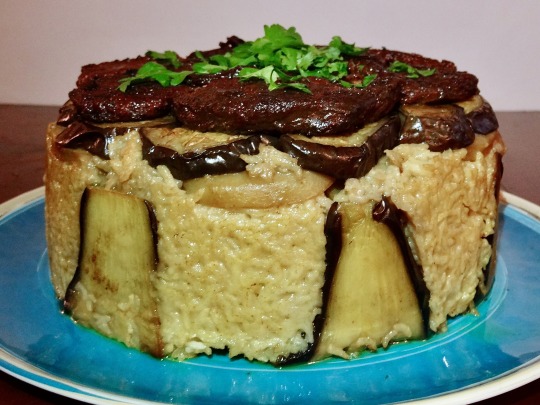
[ID: A wide cylindrical pile of rice, eggplants, and 'lamb' on a serving platter, garnished with parsley. End ID]
مقلوبة / Maqluba
مَقْلُوبَة ("maqlūba," "upside down" or "turned over") is a Levantine casserole in which spiced meat, fried vegetables, and rice are arranged in a pot and simmered; the entire pot is then inverted onto a serving tray to reveal the layered ingredients. Maqluba historically uses lamb and eggplant, but modern recipes more often call for chicken; tomato, cauliflower, potato, bell pepper, and peas are other relatively recent additions to the repertoire.
A well-made maqluba should be aromatic and highly spiced; the meat and vegetables should be very tender; and the rice should be cohesive without being mushy. A side of yoghurt gives a tangy, creamy lift that cuts through and complements the spice and fat in the dish.
Maqluba emphasizes communal eating and presentation. It is usually eaten during gatherings and special occasions, especially during Ramadan—a month of sunrise-to-sunset fasting which celebrates the revelation of the Qu'ran to the prophet Mohammad. The pot is sometimes flipped over at the table for a dramatic reveal.
History
Many sources cite Muhammad bin Hasan al-Baghdadi's 1226 Kitāb al-ṭabīkh (كتاب الطبيخ لمحمد بن حسن البغدادي) as containing the first known reference to maqluba. However, the recipes for "maqluba" in this book are actually for small, pan-fried patties of spiced ground meat. [1] The dish is presumably titled "maqluba" because, once one side is fried, the cook is instructed to turn the patties over ("أقلب الوجه الآخر") to brown the other; the identical name to the modern dish is thus coincidental.
References to dishes more like modern maqluba occur elsewhere. A type of مغمومة ("maghmūma," "covered" dish), consisting of layers of meat, eggplant, and rice, covered with flatbread, cooked and then inverted onto a serving plate, is described in a 9th-century poem by إبراهيم بن المهدي (Ibrāhīm ibn al-Mahdī):
A layer of meat underneath of which lies a layer of its own fat, and another of sweet onion, another of rice, Another of peeled eggplant slices, each looking like a good dirham honestly earned. [...] Thus layered the pot is brought to a boil first then enclosed with a disc of oven bread. On the glowing fire it is then put, thus giving it what it needs of heat and fat. When fully cooked and its fat is well up, turn it over onto a platter, big and wide. (trans. Nawal Nasrallah) [2]
These sources are both Iraqi, but one story holds that maqluba originated in Jerusalem. صلاح الدين الأيوبي (Ṣalāḥ ad-Dīn al-Ayyūbi; "Saladin"), after capturing the city from the Crusaders and reinstating Muslim rule in 1187, was served the dish, and was the first to describe it with its current name. Before this point, the Jerusalem specialty had supposedly been known as "باذنجانية" ("bāḏinjānīyya"), from "باذنجان" "bāḏinjān" "eggplant" + ية- "-iyya," a noun-forming suffix.
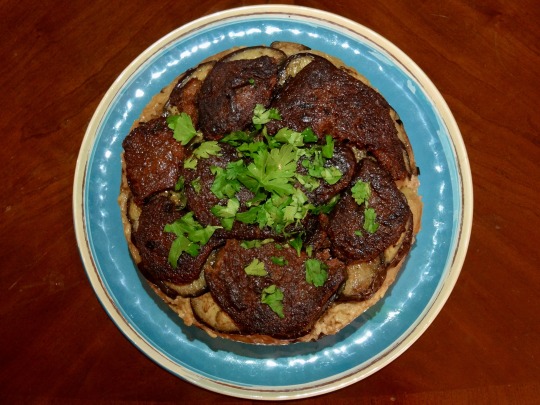
[ID: The same dish shown from directly above. End ID]
In Palestine
Maqluba is often invoked in the context of Palestinian strength and resistance, in defiance of its occasional description as an "Israeli" dish. Palestinian magazine writer Aleeya Rizvi reflects:
In the wake of the recent [2023] war in Gaza, our culinary endeavors, particularly in crafting and sharing traditional Palestinian dishes like Maqluba, represent a conscious effort to contribute to the preservation and resilience of Palestinian culture. In a time when cultural heritage is under threat, preparing and enjoying these time-honored recipes becomes more than a mere culinary activity; it transforms into a deliberate act of cultural continuity and solidarity.
Maqluba also has a more specific association with physical resistance against the backdrop of increased settler and police violence against Palestinians, including regular Israeli raids and attacks on the جامع الأقصى ("Jāmi' al-Aqṣā"; al-Aqsa mosque), during Ramadan.
The holiest month in the Islamic calendar, Ramadan is given over to fasting, prayer, and reflection; people gather together in homes and mosques to break their fast after sunset, and spend entire nights in mosques in worship. Khadija Khwais and Hanady Al-Halawani used to serve maqluba for افطار ("ifṭār," fast-breaking meal) in the Al-Aqsa mosque, until Israeli occupation authorities banned them from the mosque for "incitement."
In response, starting in 2015, Al-Halawani and other volunteer مرابطين ("murābiṭīn," lit. "holy people," guardians of the mosque) stationed themselves on the ground outside the mosque's gate (باب السلسلة; Bāb as-Silsila, "chain gate") to prepare and serve maqluba. Those who were banned from entering the mosque broke their fast and prayed at the mosque's gates, and in the nearby alleys of the Old City. The same year saw Israeli security personnel and settlers attack Palestinian protestors and guardians outside and inside the mosque with tear gas and stun grenades.
For Al-Halawani, the serving of maqluba at the al-Aqsa gates symbolizes "defiance, steadfastness, and insistence on continuing the fast [...] in spite of the occupation’s practices." The "Maqluba at al-Aqsa" ritual "has become one of the most disturbing Palestinian scenes for the occupation forces," who associate it with the defense of "Palestinian heritage" and the intent to "motivate worshipers and murabitin to repel incursions into the mosque." (Al-Halawani has been arrested, threatened, beaten, and detained by Israeli police multiple times for her role as a defender of Al-Aqsa. She was among the prisoners freed in trades between Israel and Hamas in December 2023.)
In 2017, occupation forces installed metal detectors, electronic gates, metal barriers, and police cameras to surveil worshipers following a shoot-out at one of al Aqsa's gates. Hundreds of protesters refused to enter the mosque until the repressive measures were removed, instead gathering and praying in its courtyard; surrounding families bolstered the sit-ins by serving food and drink. When the gates were dismantled, over 50,000 people gathered to eat maqluba in celebration, picking up on the earlier association of the dish with Saladin's victory (and its resultant alternate name, "أكلة النصر," "ʔakla an-naṣr," "victory meal").
The name "maqluba," meaning "upside-down" or "inverted," may be associated with victory and resistance as well. Fatema Khader noted in 2023 that the method of serving maqluba was a "symbolic representation of how Israeli policies and decisions against Palestinians will be flipped on their heads and become rendered meaningless." It is also relevant that maqluba is meant to be served to large groups of people, and can thus be linked, symbolically and literally, to solidarity and communal resistance.
This year in Gaza, Palestinians show steadfast optimism as they paint murals, hang lanterns, buy sweets, hold parties, and pray in groups amongst the rubble where mosques once stood. But despite these efforts at creating joy, the dire circumstances take heavy tolls, and the holiday cannot be celebrated as usual: Israel's campaign of slow starvation led Ghazzawi Diab al-Zaza to comment, "We have been fasting almost against our will for three months".
Donate to provide hot meals in Gaza for Ramadan
[1] Also reprinted in Mosul: Umm Al-Rubi'in Press (مطبعة ام الربيعين) (1934), p. 57. For an English translation see Charles Perry, A Baghdad Cookery Book (2005), pp. 77-8.
[2] This poem, as well as one of Ibn al-Mahdi's maghmuma dishes, were compiled in Ibn Sayyar al-Warraq's 10th-century Book of Dishes (كتاب الطبيخ وإصلاح الأغذية المأكولات وطيّبات الأطعمة المصنو; "Kitāb al-ṭabīkh waʔiṣlāḥ al-ʔaghdiyat al-maʔkūlāt waṭayyibāt ʔaṭ'ima al-maṣno," "Book of cookery, food reform, delicacies, and prepared foods"), p. 99 recto. For Nasrallah's English translation see Annals of the Caliph's Kitchens, pp. 313-4.
In the 14th-century Andalusian Cookbook (كتاب الطبيخ في المغرب والأندلس في عصر الموحدين، للمكلف المجهول; "Kitāb al-ṭabīkh fī al-Maghrib wa al-Andalus fī ʻaṣr al-Mawahḥidīn," "Book of cookery from the Maghreb and Andalusia in the era of Almohads"), a maghmuma recipe appears as "لون مغموم لابن المهدى", "maghmum by Ibn al-Mahdi". For an English translation see An Anonymous Andalusian Cookbook, trans. Perry et al.
Ingredients:
For a 6-qt stockpot. Serves 12.
For the meat:
1 recipe seitan lamb
or
2 cups (330g) ground beef substitute
1 cinnamon stick
1 bay laurel leaf
Pinch ground cardamom
Several cracks black pepper
For the dish:
3 cups (600g) Egyptian rice
2 medium-sized globe eggplants
2 large Yukon gold potatoes (optional)
Vegetarian 'chicken' or 'beef' bouillon cube (optional)
2 1/2 tsp table salt (1 1/2 tsp, if using bouillon)
Vegetable oil, to deep-fry
Fried pine nuts or sliced blanched almonds, to top
Egyptian rice is the traditional choice in this dish, but many modern recipes use basmati.
I kept my ingredients list fairly simple, but you can also consider adding cauliflower, carrots, peas, chickpeas, zucchini, bell pepper, and/or tomato to preference (especially if omitting meat substitutes).
For the spices:
1 1/2 Tbsp maqluba spices
or
1 4" piece (3g) cinnamon bark, toasted and ground (1 1/2 tsp ground cinnamon)
3/4 tsp (2.2g) ground turmeric
3/4 tsp (1.5g) cloves, toasted and ground
3/4 tsp (2.2g) black peppercorns, toasted and ground
15 green cardamom pods (4.5g), toasted, seeds removed, and ground (or 3/4 tsp ground cardamom)
Instructions:
For the meat:
1. Prepare the seitan lamb, if using: it will need to be started several hours early, or the night before.
2. If using ground meat: heat 2 tsp oil in a skillet on medium. Add cinnamon stick and bay leaf and fry for 30 seconds until fragrant.
3. Add meat and ground spices and fry, agitating occasionally, until browned. Set aside.
For the dish:
2. Rinse rice 2 to 3 times, until water runs almost clear. Soak in cold water for 30 minutes, while you prepare the vegetables.
3. Optional: to achieve a presentation with eggplant on the sides of the maqluba, remove the skin from either side of one eggplant (so that all slices have flesh exposed on both sides) and then cut lengthwise into 1/2" (1cm)-thick slices.
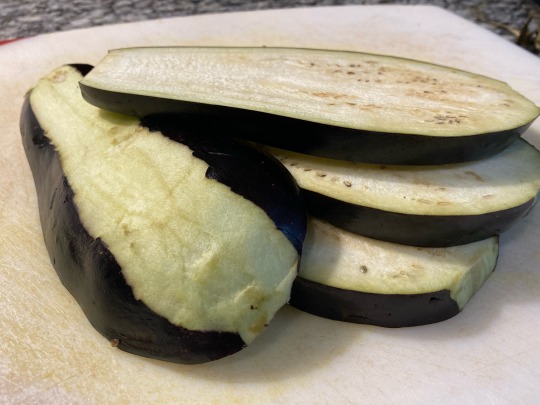
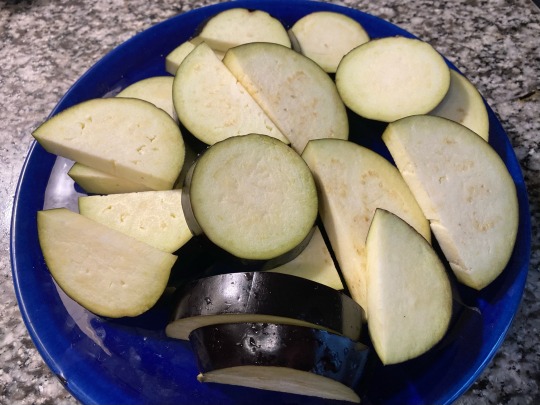
Cut the other eggplant (or both eggplants) widthwise into coins and half-coins.
4. Sprinkle eggplant slices with salt on both sides and leave for 10-15 minutes to release water.
5. Peel potatoes and cut in 1/4" (1/2 cm) slices.

6. Heat about an inch of oil in a deep skillet or wok on medium (a potato slice dropped in should immediately form bubbles). Fry the potato slices until golden brown, then remove onto a paper-towel-lined plate or wire cooling rack.
7. Press eggplant slices on both sides with a towel to remove moisture. Fry in the same oil until translucent and golden brown, then remove as before.
Fry other vegetables (except for tomato, chickpeas, and peas) the same way, if using.
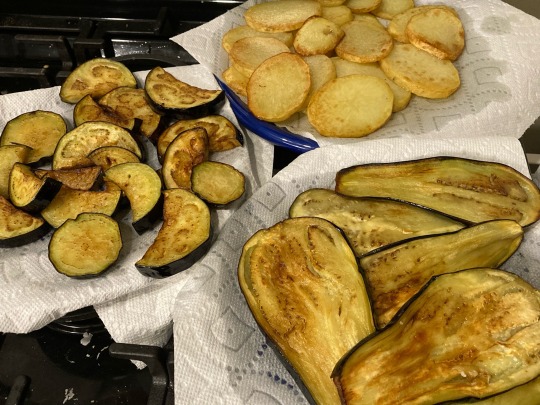
8. Drain rice. Whisk bouillon, salt, and ground spices into several cups of hot water.
9. Prepare a large, thick-bottomed pot with a circle of oiled parchment paper (or with a layer of sliced tomatoes). Add ground meat, if using. Layer widthwise-sliced eggplants into the pot, followed by potatoes. Place longitudinally sliced eggplants around the sides of the pot, large side up.
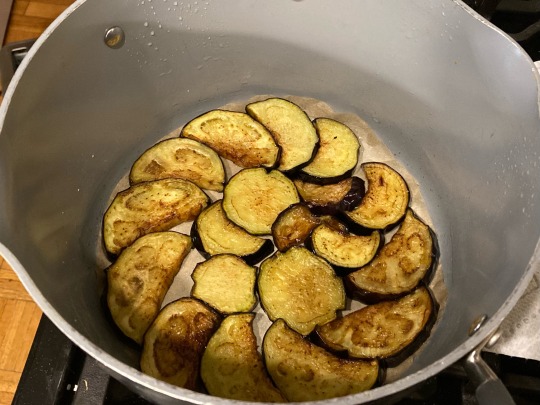
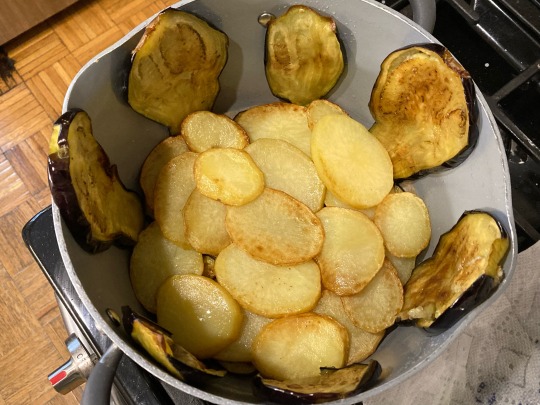
10. Add rice and pack in. Fold eggplant slices down over the rice, if they protrude.
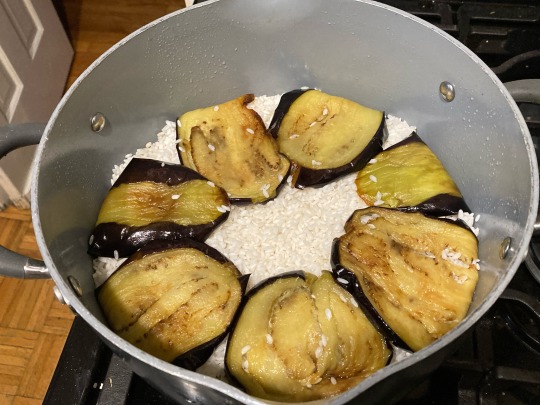
11. Pour broth into the pot, being careful not to upset the rice. Add more water if necessary, so that the rice is covered by about an inch.
12. Heat on medium to bring to a boil. Reduce heat to low, cover with a closely fitting lid, and cook 30 minutes.
13. If rice is not fully cooked after 30 minutes, lightly stir and add another cup of water. Re-cover and cook another 15 minutes. Check again and repeat as necessary.
14. Allow maqluba to rest for half an hour before flipping for best results. Place a large platter upside-down over the mouth of the pot, then flip both over in one smooth motion. Tap the bottom of the pot to release, and leave for a few minutes to allow the maqluba to drop.
15. Slowly lift the pot straight up, rotating slightly if the sides seem stuck.
16. Top with fried seitan lamb, chopped parsley, and fried pine nuts or almonds, as desired.
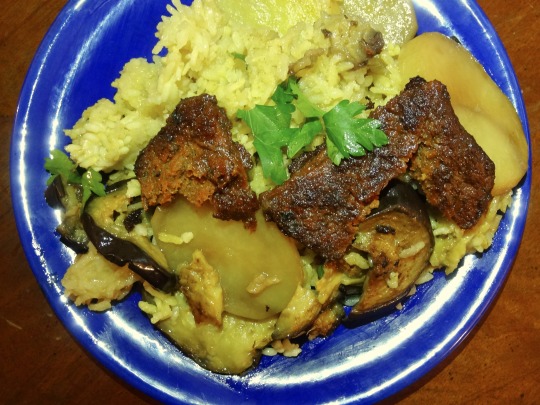
368 notes
·
View notes
Note
Hi, do you have any tips on how to be comfortable being a Muslim while being queer?
I've been trying to do that for a very long time, focusing on my faith in Allah, but it's a bit hard and I always get demotivated randomly :(
Hey! Salam! Sorry for the kind of late response, moving houses has been hectic. This will be a long response (sorry), so I will put it under the cut.
I want to preface this by saying every queer person is different. I don't know the specifics of your identity so I am going to cover both sexual queerness and gender queerness.
My biggest obstacle in nurturing my relationship with Allah was believing that the way I am was haram, and even that I was cursed by Allah. I no longer believe this, but it was a long road.
Sexuality
I don't believe that homosexuality is haram. The common claim that the story of Lut is about homosexuality is full of holes and inconsistencies and it's largely based on the Christian religious tradition, even if the grammar of the Qur'an doesn't align with the Christian tradition (eg. the Qur'an uses the word "banaat" for Prophet Lut's (as) daughters. Bannat is plural, meaning 3 or more daughters, and in the traditional telling Lut (as) has 2 daughters).
Here is a really good study by Nahida Nisa:
I recommend reading all of Nahida's things because she's an amazing writer.
And a video from Dr. Shehnaz Haqaani's (PhD, Islamic Studies) podcast "What The Patriarchy":
youtube
and you can find her blog here
These articles from the blog, Lamp of Islam are also pretty good. He is a hardcore Qur'anist with some strange opinions, so peruse his blog with caution.
Letting go of the belief that the way I am was haram and that Allah had cursed me was the most critical part of fixing my iman and overall nurturing my relationship with Allah.
Also, it doesn't make any sense that The All-Merciful, Allah would make someone with an innate attraction to the same gender and then forbid them from "acting on it".
The Prophet (salla Allahu alayhi wa salam) never punished anyone for homosexuality, after his death, his companions debated whether or not to punish homosexuals and they could not come to a conclusion.
Gender
The Qur'an seems to acknowledge the differences between sex and gender. For example, the word for 'man' in the Qur'an is rijal and the word for 'male' is dhukran. And the word for 'woman' is nisa, but the word for 'female' is untsa. You can read Lamp of Islam's article on the meanings of these words here.
There also may be a vague reference to intersex and/or gender non-conforming people in verse 42:50.
There are also some hadith that seem to imply that gender non-conforming people were accepted around Prophet Muhammad (salla Allahu alayhi wa salam). Prophet Muhammad's (Salla Allahu alayhi wa salam) wife Umm Salama (Radi Allahu anha) had a seemingly close friend who was then called a 'mukhanath', named Hit, who was described as a 'male who exhibited effeminate traits' was was welcome into the private women's section of the Prophet's (Salla Allahu alayhi wa salam) home. Today this person might have been a gay man (who displayed effeminate traits by accepting the "woman's role" (🙄) in relationships), or, more likely IMO, this person would be considered a trans woman today.
Hit was punished by the Prophet (salla Allahu alayhi wa salam), but not for their sexuality/gender expression, they were punished for describing a woman's body to a man, which was possible because they were allowed into both men's and women's spaces. The punishment of Hit is often used as 'evidence' to support homophobia and transphobia, but they neglect to mention the specific reason that Hit was punished.
You can read more about queerness in Islamic history here.
The link above takes you to Muslims For Progressive Values, they also offer marriage services for queer Muslims and interfaith couples, specifically for Muslim women seeking to marry non-Muslim men.
Here is a link to MPV's video series, but massive trigger warning for the comment section.
And a second MPV video series.
And another article from MPV.
More Tips
As I said, learning about LGBTQ Islamic History helped me a lot.
Keep your relationship with Allah between you and Him. Only share it with people who you 100% trust, because religion is extremely personal.
Find your people. Whether online or in-person, a community of people like you is important.
Know that Allah knows you, your identity, and the way you feel. Ultimately, Allah is your creator and we will only return to him. And we, as queer people KNOW that this is the way we were created. Nobody can tell you that who you are is false because they have no way to know that.
Block. Block. Block. Block. Block anyone who is being a problem, who might become a problem in the future. Block them all. Block Islamophobic queers, block queerphobic Muslims. Protect your peace and your relationship with Allah at all costs.
Here are people that I block quickly: anyone who has outwardly queerphobic or Islamophobic things posted on their page. Salafis and Wahabis. The black flag freaks: those with black flags in their user names/bios. I block people for the comments they leave all the time. Generally, I don't wait for them to do something, I block them on sight.
You mentioned that you struggle with low imaan sometimes. It's important to know that fluctuations of imaan are normal and completely natural. But I'm assuming since you've sent this ask, you always come back, which is what's important.
Here is another video from Dr. Shehnaz Haqaani's (PhD Islamic Studies) Podcast for Muslims who struggle to practice.
And a TikTok from @/soundous.boualam:
My biggest tip for building faith is to start slow.
Pray one prayer a day at first, and wait until that prayer is deeply ingrained into your habits, then add another. I recommend starting with Isha before bed. Don't try to do everything at once. You'll burn yourself out.
Build up the fard actions. Your prayers, primarily.
If you can take on more, add in the dhikr after prayer (subhanallah 33x, alhamdullilah 33x, and allahu akbar 34x). Or add dhikr in throughout your day. I use an app called Azkar that I set to send notifications to remind me to do various worship activities.
When I braid my hair I say alhamdullilah every time I cross a piece over another.
If you can, it might also help to put a poster or picture on your wall with your favorite Qur'an verse, hadith, or Islamic quote on your wall, or make your screensaver a reminder to remember Allah.
You can also buy or make a beaded tasbih bracelet, sometimes having something on your wrist can make it easier to remember.
I also like to spend 20-30 minutes every morning after Fajr to just spend time with Allah, talk to Him, and read the Qur'an.
But also remember that you don't only get rewarded for outright acts of worship. You get rewarded for caring for your body, taking a nap when you're tired, eating food, drinking water, caring for pets, and spending time with family. All of that stuff is worship.
Be easy with yourself. Allah does not want hardship for you (2:185).
And I'll leave you with a Qur'an verse.
It was We Who created man, and We know what his soul whispers to him, and We are closer to him that [his] jugular vein. (50:16)
I hope this helps you some. I love you. Allah loves you. May Allah bless you with peace, imaan, and His abundant guidance and mercy, Allahumma Ameen.
You can ask questions in the comments or in asks if you want.
167 notes
·
View notes
Text
🧵𝐍𝐨, 𝐈𝐭 𝐃𝐢𝐝𝐧’𝐭 𝐒𝐭𝐚𝐫𝐭 𝐨𝐧 𝐎𝐜𝐭𝐨𝐛𝐞𝐫 𝟕𝐭𝐡: 𝐂𝐞𝐧𝐭𝐮𝐫𝐢𝐞𝐬 𝐨𝐟 𝐉𝐞𝐰𝐢𝐬𝐡 𝐏𝐞𝐫𝐬𝐞𝐜𝐮𝐭𝐢𝐨𝐧 𝐢𝐧 𝐭𝐡𝐞 𝐌𝐢𝐝𝐝𝐥𝐞 𝐄𝐚𝐬𝐭.🧵
Thread: The idea that Arabs loved Jews until the creation of Israel is a widespread and untrue myth. Many believe that Jews were welcomed and lived peacefully among Arabs until the establishment of the modern state of Israel in 1948. This view is not only historically inaccurate but dangerously overlooks the long and painful history of Jewish suffering in the Middle East. Long before Zionism, Jews faced massacres, forced conversions, and expulsions in regions once ruled by the Arabs. In fact, Jews in the Arab world endured centuries of persecution under both Muslim and Ottoman rulers. Here’s a look at some of the most significant massacres and pogroms throughout this period, revealing the true story of Jewish life in the Middle East.

1. The Massacre of the Banu Qurayza (627 CE).
Long before Zionism, Jewish communities in the Middle East endured persecution, including one of the earliest and most harrowing incidents: the massacre of the Banu Qurayza in Medina during the time of the Prophet Muhammad.
The Banu Qurayza, a Jewish tribe in Medina, had entered into a pact with Muhammad under the Constitution of Medina, which allowed Muslims and Jews to coexist. However, during the Battle of the Trench, the tribe was accused of conspiring with Muhammad’s enemies, the Quraysh. After the Muslim victory, Muhammad and his forces besieged the Banu Qurayza’s fortress, forcing their surrender.
What followed was brutal. A tribunal led by Sa’d ibn Mu’adh sentenced all adult males of the tribe to death and enslaved the women and children. To determine who qualified as an “adult male,” boys were subjected to inspections for signs of puberty, specifically the presence of pubic hair. Those deemed adults were executed alongside the men. Historical sources, such as Ibn Ishaq and al-Tabari, report that between 600 and 900 men and boys were killed, their bodies dumped into trenches.
The Banu Qurayza’s women and children were sold into slavery, marking the total destruction of the tribe. This event illustrates the precarious and often deadly position of Jewish communities in the early Islamic period, long before the creation of Israel or the modern conflict in the region.
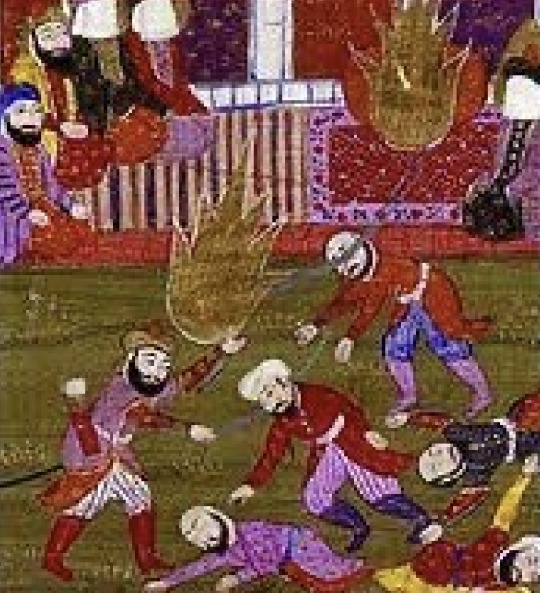
2/ Granada Massacre (1066) - Al-Andalus (Muslim Spain).
The first well-documented massacre of Jews in the Middle East dates back to 1066 in Granada, part of the Muslim-ruled Al-Andalus (Muslim Spain). After a Jewish vizier, Joseph Ibn Naghrela, was blamed for the death of the Muslim king, the situation escalated. A mob of Muslims, inspired by rumors and political tension, attacked the Jewish population of Granada. Over 4,000 Jews were slaughtered in a brutal pogrom that saw entire families butchered, their homes looted, and their properties destroyed. This massacre was part of a larger pattern of Jewish scapegoating across Muslim-ruled territories during periods of political instability. The massacre marked a turning point for Jews in the Iberian Peninsula, with many fleeing to other parts of the Muslim world for safety.

3/ The Persecution of Jews in Yemen: 1165 to 1679
The Jewish community in Yemen endured centuries of brutal persecution, systemic discrimination, and forced displacement, with two particularly devastating events defining their history before modern Zionism.
In 1165, during the reign of the Muslim leader Abd-al-Nabi ibn Mahdi, Yemen’s Jews faces an ultimatum: convert to Islam or face death. This period marked one of the earliest recorded instances of mass violence against Yemeni Jews. Synagogues were destroyed, and Jewish religious practices were outlawed. While some Jews fled or were forcibly converted, others were massacred for refusing to abandon their faith. This event signified the precarious existence of Jews in Yemen, where tolerance depended on the ruler’s whims.
Centuries later, in 1679, the Yemeni Jewish community faced an even more catastrophic event known as the Mawza Exile. Under the rule of Imam Al-Mahdi Ahmad, all Jews were expelled from their homes and forced into the barren Mawza desert. The journey itself claimed thousands of lives due to starvation and disease. Those who survived the desert exile were not allowed to return to their homes for several years, and when they did, they found their properties confiscated and their communities decimated. This period permanently weakened the Jewish presence in Yemen.
Throughout these centuries, Yemeni Jews were subjected to the degrading status of dhimmi under Islamic law, requiring them to pay exorbitant taxes, wear distinctive clothing, and accept legal and social inferiority. Forced conversions, kidnappings, and violent riots were regular occurrences. Despite these challenges, the community persisted, holding on to their traditions and faith until most were ultimately forced to leave Yemen in the mid-20th century.
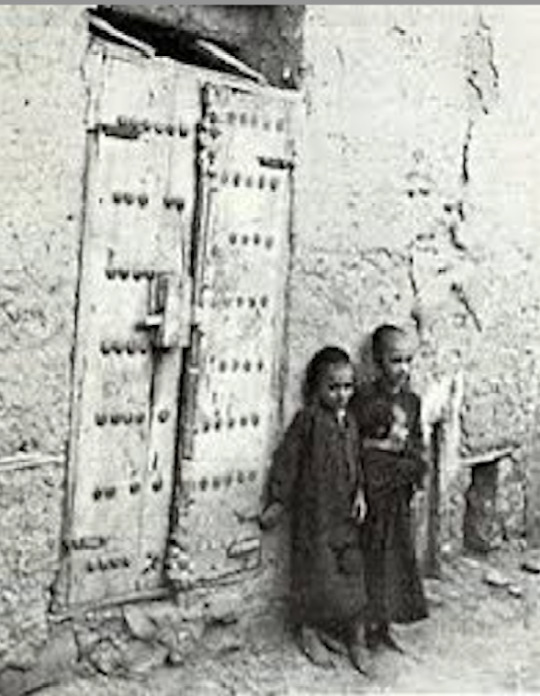
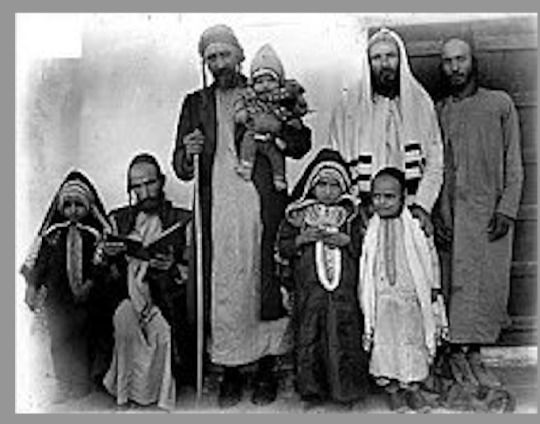
4/ The Safed Attacks (1517).
In 1517, following the Ottoman conquest of the Levant from the Mamluks, chaos erupted in the city of Safed, one of the holiest cities in Judaism. The transition of power unleashed lawlessness, and Jewish communities became an easy target for violence.
Led by rogue Ottoman soldiers and local mobs, the attacks on Safed’s Jews were devastating. Homes and synagogues were looted and burned, and many Jews were brutally murdered. The violence displaced much of Safed’s Jewish population, forcing survivors to flee to neighboring areas.
Safed had been a center of Jewish learning and spirituality, with a thriving community. The attacks disrupted this flourishing cultural hub and instilled fear among Jews living in Ottoman-controlled lands. This event was one of the earliest indications that even under the Ottomans, Jewish communities would face intermittent violence and persecution, often fueled by local unrest and anti-Jewish sentiment.
The Safed Attacks of 1517 were a sad reminder of how quickly Jewish communities could become scapegoats during periods of political upheaval, long before modern Zionism or the establishment of Israel.
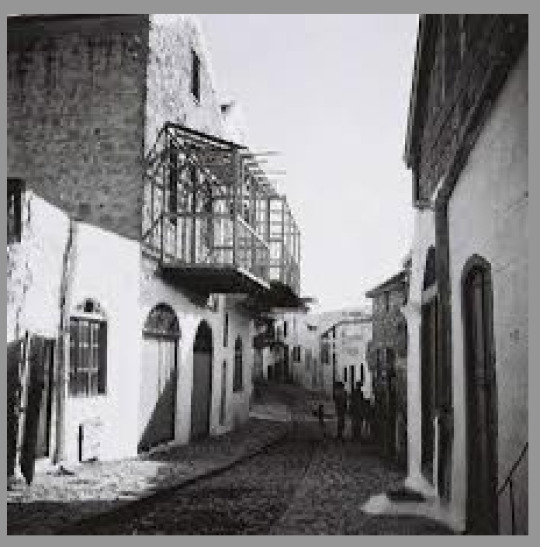
5/ The Tripoli Pogrom (1785).
In 1785, the Jewish community of Tripoli, Libya, endured a catastrophic pogrom instigated by Ali Burghul, an Ottoman officer who temporarily seized power in the region. After overthrowing the ruling pasha, Burghul wanted to consolidate his rule by targeting the city’s vulnerable minorities, particularly Jews.
The violence against Jews was brutal and systematic. Jewish homes and businesses were looted, synagogues were desecrated, and many Jews were tortured or killed. The pogrom decimated the Jewish quarter of Tripoli, leaving countless families homeless and destitute.
While Burghul’s regime lasted less than a year, the damage to the Jewish community was profound and long-lasting. Survivors faced the daunting task of rebuilding their lives amidst persistent discrimination and insecurity. This pogrom was a stark reminder of the precarious existence of Jews in North Africa, where they were often targeted during periods of political upheaval.
The Tripoli Pogrom of 1785 shows you again, the centuries-long persecution faced by Jews in Arab lands, well before the emergence of modern Zionism or the creation of Israel.
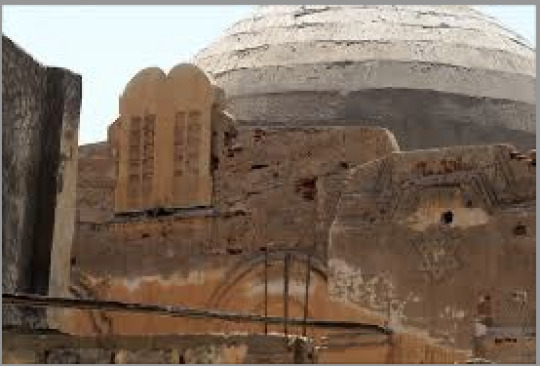
6/ The Baghdad Pogrom (1828).
In 1828, the Jewish community in Baghdad, Iraq, was subjected to one of the most devastating anti-Jewish pogroms in Ottoman-controlled Iraq. Tensions between Jews and Muslims had been rising due to a combination of economic envy, political instability, and increasing religious intolerance.
The pogrom began when a prominent Muslim figure, incited by local political and economic disputes, spread false accusations against the Jews of Baghdad. Jews were blamed for a series of issues, including alleged economic exploitation and religious violations, though no evidence supported these claims.
A violent mob quickly assembled, attacking Jewish homes, shops, and synagogues. Many Jews were beaten, and several were killed in the streets. Property was looted, and entire neighborhoods were set on fire. The violence lasted for several days, and it is estimated that several dozen Jews were killed, with many more injured or left destitute.
The pogrom also resulted in mass destruction of Jewish religious and cultural landmarks in Baghdad, severely damaging the local Jewish community’s infrastructure. This event left lasting scars on the Jewish population, contributing to a growing sense of insecurity and vulnerability. While the situation temporarily improved, the event remained a painful chapter in the history of Jewish life in Iraq.
The Baghdad Pogrom of 1828 showed how easily Jews were targeted and scapegoated in times of political and religious tension, long before the rise of modern Zionism or the establishment of Israel.

7/ The 1838 Safed Pogrom.
The second major pogrom in Safed, occurring in 1838, further demonstrated the uncertain position of Jews in the region during Ottoman rule. This wave of violence took place during the Egyptian-Ottoman War, as Ibrahim Pasha’s Egyptian forces temporarily controlled Israel. When Ibrahim’s forces retreated from Safed, local Arab mobs, emboldened by the chaos and lack of authority, turned their fury on the city’s Jewish population.
Over several days, armed bands ransacked Jewish homes, robbed businesses, and desecrated synagogues. Entire families were beaten and humiliated, while women and children were subjected to horrifying abuse. Many Jews fled to the surrounding hills for safety, living in caves or shelters with little food or water, while those who remained in the city faced murder or severe physical violence.
The Ottoman authorities did little to restore order or protect the Jewish residents. The aftermath of the pogrom left the Jewish quarter of Safed devastated, with entire families displaced and ancient synagogues reduced to ruins. Survivors recounted harrowing stories of betrayal by neighbors who joined in the looting and violence. The 1838 pogrom was a traumatic event that further destabilized the already struggling Jewish community in Safed, leading many to consider emigration.
The recurring violence in Safed was a reminder of the vulnerability of Jewish communities in Israel long before the modern Zionist movement emerged.
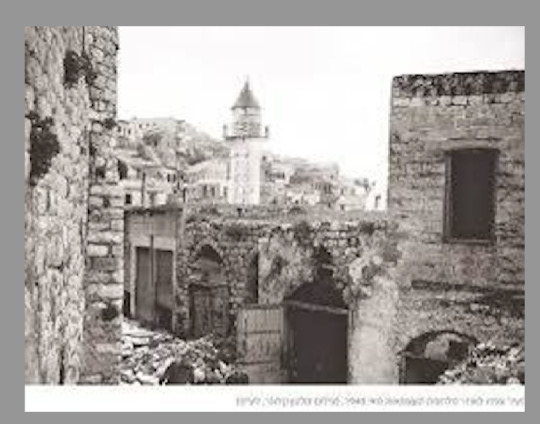
8/ The 1840 Damascus Affair
The Damascus Affair of 1840 was a horrifying example of the blood libel myth, a baseless and antisemitic accusation that Jews murder non-Jews to use their blood for religious rituals. This particular incident unfolded in Ottoman-controlled Damascus and left a deep scar on Jewish communities across the region and beyond.
The tragedy began when Father Thomas, a Catholic monk, and his Muslim servant mysteriously disappeared. Almost immediately local Christian leaders accused the Jewish community of abducting and murdering them for their blood, supposedly to bake matzot for Passover. The accusation, entirely unfounded, unleashed a torrent of violence and state-backed persecution against Damascus’s Jews.
Under pressure from local Christian clergy, the Ottoman authorities arrested several prominent Jewish figures, including rabbis and community leaders. These men were subjected to brutal torture to extract confessions to a crime they did not commit. Torture methods included floggings, burning, and deprivation of food and water. One man, Isaac Harari, died from the torture, and another, Aaron Monshe Rehama, succumbed to his injuries shortly after being released. The torture yielded forced confessions that only fueled further hysteria.
As rumors spread, mobs looted Jewish homes and desecrated synagogues. The community lived in terror, with many families hiding in fear of further arrests or violence. The situation worsened when the Ottoman authorities imprisoned dozens more Jews, including children, in an attempt to pressure the community into “confessing” to collective guilt.
The Damascus Affair also had international implications. Initially, France supported the blood libel accusations due to the influence of local Catholic leaders. However, prominent Jews in Europe, including Sir Moses Montefiore, Adolphe Crémieux, and Salomon Munk, mobilized a vigorous diplomatic campaign to challenge the lies. They traveled to Alexandria and Constantinople, lobbying influential leaders like Muhammad Ali of Egypt and Sultan Abdülmecid I of the Ottoman Empire to stop the persecution.
Eventually, after months of pressure and mounting evidence of the absurdity of the charges, the surviving Jewish prisoners were released. Still, the community was left in ruins. The aftermath of the affair saw Damascus’s Jewish population diminished and traumatized. Many families fled, and those who remained lived under the shadow of renewed accusations.
The Damascus Affair exposed yet again the fragility of Jewish life under Ottoman rule and the enduring danger of antisemitic myths, this as well happened long before the creation of modern Zionism.

9/ The 1920 Nebi Musa Riots.
The Nebi Musa Riots, which took place during Easter week in April 1920, were among the first major instances of anti-Jewish violence in British-controlled Israel, occurring long before the establishment of modern Israel. The riots shattered the myth of peaceful coexistence between Jews and Arabs in the region and exposed the hostility Arab leaders harbored toward the growing Jewish community.
Nebi Musa was a Muslim religious festival traditionally marked by processions to a shrine near Jericho. In 1920, the festival coincided with Easter and Passover, bringing an unusually large number of Muslims, Christians, and Jews to Jerusalem. Arab leaders, including Haj Amin al-Husseini (later notorious for his collaboration with the Nazis), used the occasion to incite the crowds against the Jewish community. They spread false claims that Jews were threatening the Al-Aqsa Mosque and seeking to take over Muslim holy sites, a tactic that would recur in later decades.
The inflammatory rhetoric worked. On April 4, 1920, Arab mobs began attacking Jewish neighborhoods in Jerusalem. Armed with knives, clubs, and stones, they looted Jewish homes and businesses, burned property, and assaulted Jewish residents. Reports described horrific acts of violence, including the brutal killing of five Jews and the injury of over 200 others. Jewish women were targeted for sexual violence, adding to the community’s trauma.
The British authorities, unprepared for the scale of the violence, initially failed to contain the riots. British soldiers were criticized for their slow response, and some were even accused of sympathizing with the rioters. Jewish self-defense groups, including the Haganah’s predecessors, stepped in to protect their communities, marking one of the first organized efforts by Jews to defend themselves in modern Israel.
The aftermath of the riots further deepened tensions. Haj Amin al-Husseini, though implicated in inciting the violence, received a relatively light punishment and would later be appointed the Grand Mufti of Jerusalem, a decision with disastrous consequences. Meanwhile, the Jewish community, already shaken from European pogroms, began to view self-defense as essential for survival in the face of local hostility.
The 1920 Nebi Musa Riots are a powerful reminder that violence against Jews in the Middle East was not a product of Zionism but a reflection of deep hostility toward Jewish communities.
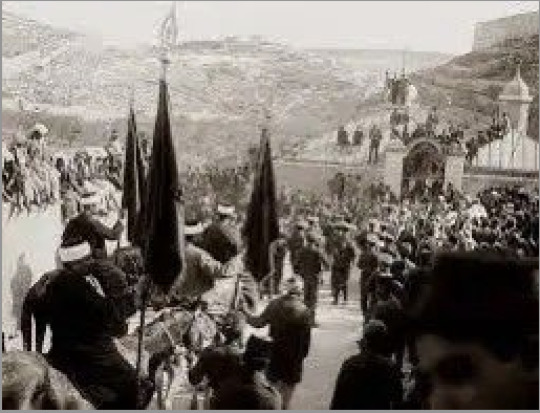
10/ The 1929 Hebron Massacre.
In August 1929, one of the darkest chapters in Jewish history under the British Mandate unfolded in the ancient city of Hebron, where a long established Jewish community had lived for thousands of years. Hebron, considered one of Judaism’s four holy cities, was home to a mix of Sephardi and Ashkenazi Jews, many of whom lived peacefully alongside their Arab neighbors, until incitement turned deadly.
Tensions had been brewing for months, fueled by false rumors spread by Arab leaders and the Grand Mufti of Jerusalem, Amin al-Husseini. Claims circulated that Jews were planning to take over the Temple Mount and destroy the al-Aqsa Mosque. These fabrications were spread intentionally to inflame anti-Jewish sentiment and provoke violence.
On the 23rd and 24th of August, Arab mobs descended upon the Jewish community of Hebron, armed with knives, clubs, and firearms. The British authorities, overwhelmed and unprepared, failed to intervene effectively. Over the course of two days, 67 Jews were brutally murdered, men, women, and children alike. Victims were tortured, mutilated, and dismembered. Entire families were wiped out in their homes.
One of the most horrific aspects of the massacre was the betrayal by neighbors. Some Arabs, with whom the Jews had coexisted peacefully for years, turned on them.
The aftermath was devastating. The Jewish quarter was looted and ransacked. Synagogues were desecrated, Torah scrolls destroyed. Survivors were forcibly evacuated by the British, ending a Jewish presence in Hebron that had lasted centuries. The city, once a symbol of coexistence, became a stark reminder of how quickly incitement and hatred could shatter fragile relations.
The massacre was part of a larger wave of violence that also targeted Jews in Jerusalem, Safed, and other areas of Israel during the same period. It was not an isolated event but a symptom of escalating hostility toward the Jewish community, years before the establishment of modern Israel.

11/ The 1941 Farhud Massacre.
The Farhud, which took place on June 1-2, 1941, was a brutal pogrom against the Jewish community in Baghdad, Iraq. The violence erupted during the Jewish holiday of Shavuot, fueled by Nazi propaganda and growing political instability. The Iraqi government, under the pro-Nazi Rashid Ali al-Gaylani, had recently been overthrown by the British, leaving the country in chaos.
Pro-Nazi mobs, fueled by years of antisemitic rhetoric, attacked Jews with brutal force. Over 180 Jews were murdered, and hundreds more were injured. Mobs looted Jewish homes, destroyed businesses, and desecrated synagogues. Women were raped, and many victims were tortured and mutilated.
The British and Iraqi authorities intervened after two days of unchecked violence, but the damage was done. The Farhud shattered the Iraqi Jewish community, marking the beginning of a mass exodus. By the 1950s, most of Iraq’s 150,000 Jews had fled, many of them to Israel.
The Farhud remains a tragic reminder of how quickly a Jewish community, with a history in the region spanning over 2,600 years, could be destroyed by hatred and incitement. It underscored the urgent need for Jewish self-determination, which Zionism sought to provide.

12/ Palestinian Collaboration with Nazi Germany.
During the 1930s and 40s, the Palestinian Arab leadership, particularly the Mufti of Jerusalem, Haj Amin al-Husseini, formed an alliance with Nazi Germany. Husseini, who opposed Jewish immigration to Israel, wanted Nazi support for his goal of preventing a Jewish homeland. In 1941, he met with Adolf Hitler, where he expressed his admiration for the Nazis’ anti-Semitic policies and urged them to support the Arab cause against the Jews. Husseini also played a role in recruiting Muslim soldiers to fight for the Axis powers, including the notorious Waffen-SS. His collaboration with Nazi Germany, which included attempts to organize massacres of Jews in Israel, contributed to deepening the hostility and violence toward Jewish communities in the region.

Conclusion.
When I started studying and looking up these events, I was shocked by the crazy number of them. I had to choose from hundreds, if not thousands, of such atrocities throughout history. And knowing that each of these incidents means real people, Jewish men, women, and children, lost their lives or endured unimaginable torture, it broke my heart. It’s heartbreaking that, even today, we continue to prove, over and over again, how badly Jews have been treated, and how, in some corners of the world, there are still those who want us to endure even more suffering. The existence of Israel today is a direct result of all these painful events—a nation born out of the ashes of centuries of persecution. Israel stands as a shield, ensuring that Jews will never again face the horrors of those dark days. This history is not just a series of events, it’s a painful reminder of the resilience required to survive and the urgency of remembering so we can prevent such horrors from happening again.


Although not all of the events happened in the Middle east per se, all of them happened under Muslim rule.
@AP_from_NY
67 notes
·
View notes
Note
I've thought about how gentile Abrahamic religions are antisemitic religious colonialism before and it pisses me off a ton and I'm thankful you said it, but now that it's someone besides me saying it, I'm gonna give some criticism (please don't take this personally)
Everything up to Abraham (particularly Adam and Noah) have G-d creating and tending to the entirety of humanity, right?
During Abraham's time, it should stand for something that G-d tends to Hagar and Ishmael, right? Especially since Hagar gives her own name for G-d and He makes a promise to Ishmael that he'll be the father of nations (or something like that). And I think the Prophet Muhammad is supposed to be descended from Ishmael.
And Noahides are a whole Thing in all this too ofc.
But the bigger thing is there are definitely texts and interpretations that take G-d being the G-d of the Hebrews and extend it to Henotheism, but for the Jews who are purely monotheists and say there is truly only one G-d in existence and He belongs only to us, isn't it cruel to totally deny the vast majority of humanity the Divine, especially if He is still their Creator and controls the world(s) they live in?
this whole thing is coming from the assumption that judaism was always monotheistic. it wasn’t. at one point in time we were monolatrous, meaning we only worshipped one g-d but didn’t deny the existence of others. hell, the language used in the torah supports this (the way the text treats egypt’s g-ds being perhaps the most prominent example). hashem has always been our specific g-d, since before the idea emerged that he is the only g-d. our/the world’s perception of him may have since evolved into this idea of one singular deity, but it has not always been that way.
hagar and ishmael still come from our mythology surrounding our particular g-d. the idea then emerged in islam, which was born with the same jewish roots that christianity was, that muslims were descended from ishmael. and, like, i don’t really mind or care about that either way. ishmael’s not a super major figure in our folklore. the story, along others in breishit, genuinely does lend itself to the idea that hashem can be the guardian of many different peoples, families, and nations. and to tell the truth i don’t genuinely have much of a problem with sharing some folklore and roots.
but it NEEDS to be acknowledged where those roots come from. for so much of history, right up until today, christians and muslims have pretended they know our g-d and our folklore and our history better than we do. they have MURDERED us for worshipping our g-d and practicing our customs in OUR way, the way we have been since before their religions and cultures emerged. if the religions that find their roots in our culture were more willing to listen to us, respect us, and learn from us, maybe i’d be less angry. but they’re not. they’ve tried and tried and tried to eradicate us and erase where they came from and make our stuff theirs. i don’t think it has to be like that forever but i don’t think we’re very close to it not being like that as of now.
also, i can’t think of a single cultural mythology that doesn’t have a creation story of some kind. it’s just the kind of thing that societies do when they try to make sense of their place in the grand scheme. the fact that we believe our g-d created the entire world does not actually mean that that story or that g-d belongs to the entire world. the fact that everybody thinks our creation myth applies to and belongs to them is just more evidence of how widely our culture has been co-opted.
there’s nothing we can do to change the fact that our g-d has been made universal (either through the natural evolution of our theology or from colonialism and cultural theft, more likely a combination of both) and i have to be fine with that. sure, fine, the people who have adopted our g-d as their own without actually bothering to understand us at all can outnumber us by orders of magnitude.
but why does our holy city have to also be their holy city? the christians have the vatican and rome and islam has mecca and medina. why do they need jerusalem? why can’t even that just be ours?
again, i have to push this aside and be okay with sharing if i truly want to have peace in our land. and i do, because i love eretz yisrael and yerushalayim more than i hate what has been done to her. the situation has grown so far beyond the injustices i am angry about that it is impossible to right those injustices without creating brand new ones. so i will be okay with sharing our g-d, our texts, and our land. but that doesn’t mean the injustice of it won’t burn like a fire in my heart.
#txt#ask#anonymous#jumblr#< yeah fuck it i’ll tag this one. im saying a lot of things and i wanna see if they make sense to people
84 notes
·
View notes